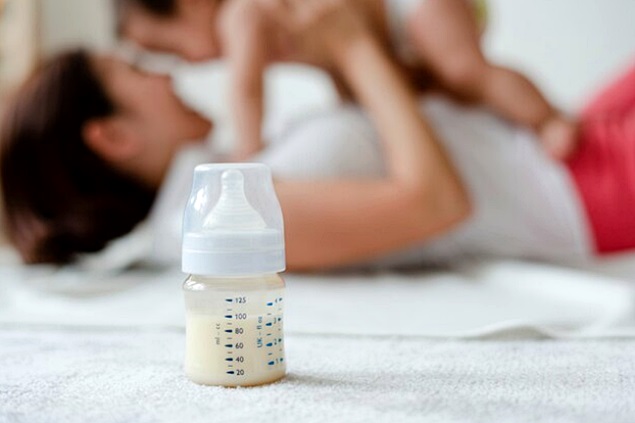1680

The complexities of breast milk can be replicated by cows? Nūmi, a France-based company, disagrees, as reported by FoodNavigator. That's why the start-up is turning to cellular culture to develop the "closest thing possible" to breast milk.
Overcoming breastfeeding challenges
French entrepreneurs Eugénie Pezé-Heidsieck and Eden Banon aim to provide better options for infant nutrition to improve the health and well-being of both mothers and children. Instead of sticking with the status quo of cow's milk-based formula, they are turning to cellular culture to replicate human milk from mammary cells.
New mothers often feel pressure to breastfeed their babies. According to recent research published in Psychiatry Research, this pressure is primarily felt from healthcare providers and the media. Both in their early 30s, the co-founders of the French start-up Nūmi, Pezé-Heidsieck and Banon, observed that this pressure and stigma negatively impact friends and family. "Sisters, cousins, and friends faced many challenges in breastfeeding their babies or decided not to breastfeed and felt very guilty," explained Banon.
Additional complications arise when babies prove to be allergic or intolerant to infant formula, the majority of which is made from cow's milk and is, as a result, deemed "inadequate," they noted.
"The complexity of breast milk meets all the developmental needs of infants, from brain and retina development to satiety regulators and strengthening the immune system. It is composed of over 1,500 constituents, and attempting to replicate this from another species is suboptimal."
For the co-founders, a possible solution lies in cellular culture. Pezé-Heidsieck and Banon established Nūmi (an abbreviation for "new milk") in 2022.
Producing breast milk in a lab
Cellular culture technology involves growing cells in controlled conditions, usually outside their natural environment. For Pezé-Heidsieck and Banon, this means recreating the environment of the mammary gland—the organ responsible for milk synthesis—so that human cells can develop and produce the respective milk.
"We use multiple sources of efficient cell lines and cultivate them in controlled conditions," said Banon to FoodNavigator. The start-up then isolates the selected cells, cultivates them in controlled conditions, and nourishes them with nutrients to grow, duplicate, and produce human milk. The final step is purification before it is ready for human consumption.
Nūmi has not yet applied for intellectual property protection, so technical details are being kept under wraps. What the co-founder did say is that, in terms of nutrition, the start-up aims to be the "best thing" after breast milk. "We will try to get as close as possible in terms of breast milk constituents."
That said, the start-up is firm that breast milk remains the best option for infants. "Breast milk is the best and will always be. We do not intend to replace breastfeeding," emphasized Banon. "We only intend to be the next best thing for women who do not want or cannot breastfeed, as well as for families who do not have access to breastfeeding options."
"Not precision fermentation"
Nūmi is not the first start-up working to disrupt the infant formula market with synthetic biology, which is not surprising given the potential market opportunity: this year, the global infant nutrition market is expected to reach $88.3 billion (€80.9 billion) and rise to over $125 billion by 2028, according to Mordor Intelligence.
Pure Mammary Factors in the US is another biotechnology company that uses cellular culture to develop human milk. In Singapore, TurtleTree produces bovine lactoferrin (which can be a prohibitively expensive ingredient in infant formula) using precision fermentation technology.
Banon emphasized that Nūmi's approach is not based on precision fermentation, where microorganisms are programmed to produce complex organic molecules such as proteins. Both technologies have positives and negatives, explained the co-founder.
"Precise fermentation can be extraordinarily useful and cost-effective to produce a single constituent, which can already be a huge improvement if you want to enhance current infant products."
"What we are trying to do here at Nūmi is to produce as many of these 1,500 constituents as possible to bring a truly new alternative to the table."
Growing competition in human milk-focused synthetic biology is a good sign, according to the co-founder, who said she is excited to see others in the field. "Largely because it's a confirmation that what we're doing is of interest, both market-wise and scientifically. And also just because we strongly believe that this is a problem that needs solutions."
Potential obstacles in a highly regulated market
Like all innovators working in cellular culture, scaling is a major challenge. This comes in the form of financial and technical hurdles. What works on a laboratory scale needs to be adjusted to work on a larger scale, explained Banon. "That's why we're trying to develop the processes with scale in mind, from day zero."
Financially, the recent closing of a €3 million pre-seed round, funded by Heartcore Capital, HCVC, and Financière Saint-James, is a positive step.
Another evident challenge for cellular culture pioneers, especially those working in infant nutrition, is regulation. Cell-based milk is considered a novel food, and in Europe, it should receive approval before market introduction from regulatory agencies. At the same time, infant nutrition is one of the most strictly regulated categories.
Nūmi takes regulation "very seriously," emphasized Banon. While still in the early stages of development, the co-founders are already working with regulatory experts in the field of novel foods.
The EU lags behind countries like Singapore and the US, where cell-based dairy and meat obtained through precision fermentation have passed official food safety tests.
For this reason, Nūmi is expected to initially launch in the US. "The United States... is more welcoming to innovations in this field and has created a more defined regulatory landscape for innovations like ours, while Europe is still evolving," they noted.
"We very much hope that Europe will follow suit and that we will be able to bring our products to European and French families quite soon."





